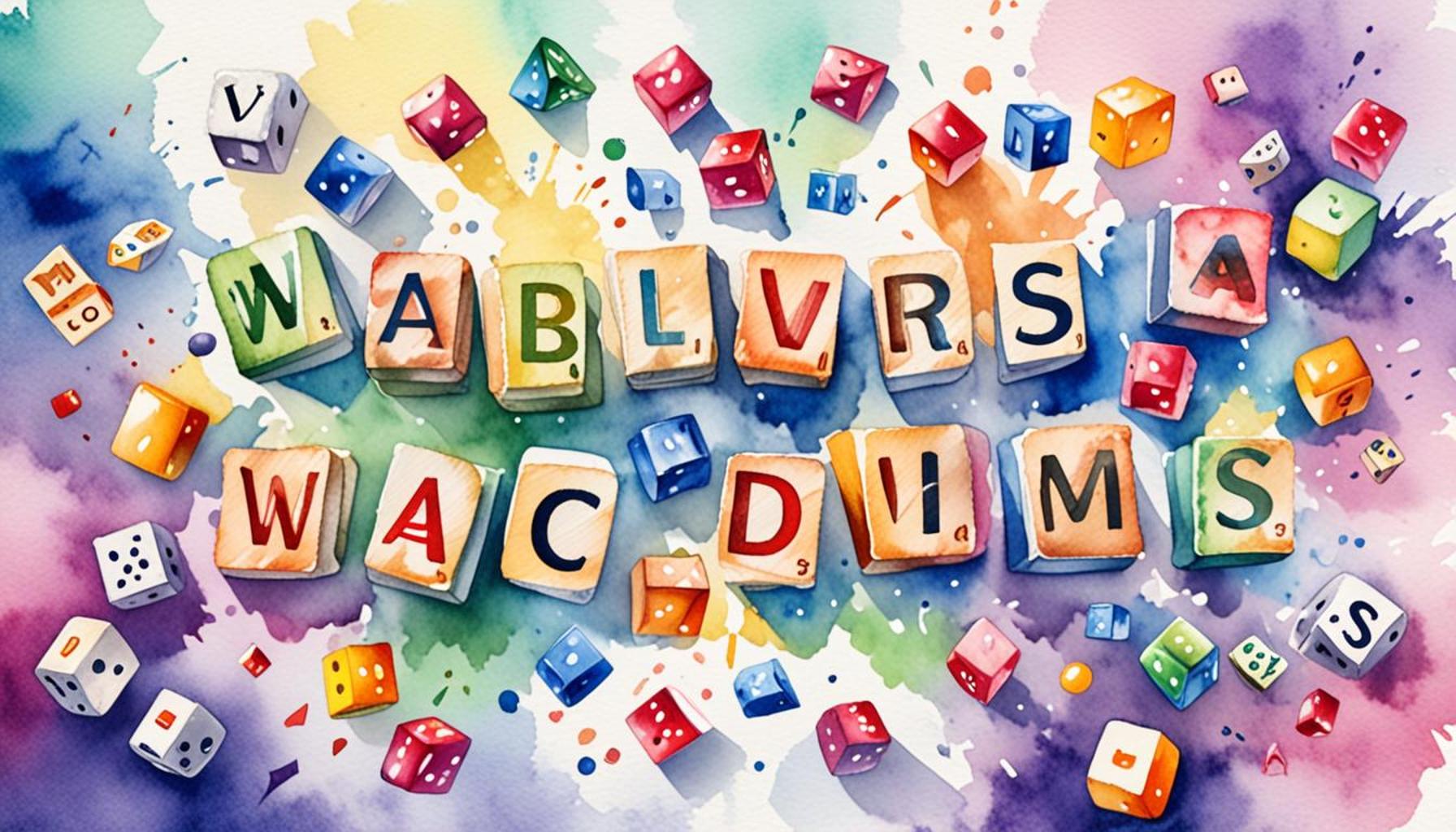The Importance of Word Games in Improving Mental Agility and Problem Solving

The Benefits of Word Games
In our fast-paced world, mental agility and problem-solving skills are more crucial than ever. The good news is that there’s an enjoyable way to boost these essential abilities—through word games. Engaging with such puzzles not only provides entertainment but also enhances cognitive function. In recent years, word games have gained popularity across different age groups, from children learning their first words to seniors keeping their minds sharp.
- Increase Vocabulary: Regularly playing word games encourages players to learn new words and their meanings. For instance, games like Scrabble require players to create words from a given set of letters, often pushing them to discover less commonly used terms. This is particularly beneficial for students and professionals seeking to improve their language skills.
- Boost Memory: Regularly engaging in word games can significantly improve memory retention and recall. A study conducted by researchers at the University of California, Berkeley, found that individuals who frequently participated in such games exhibited slower cognitive decline compared to those who did not. This highlights the role of mental exercises in keeping the brain youthful.
- Develop Critical Thinking: Challenging word puzzles promote the honing of analytical skills. For example, crossword puzzles often require players to think outside the box to decode clues, enhancing logic and reasoning abilities. This kind of critical thinking is not only essential in academics but also translates well into professional environments where problem-solving is key.
Numerous studies indicate that people who frequently engage in word games can experience a marked improvement in their mental flexibility. This skill is essential for tackling unexpected challenges efficiently. Furthermore, participating in these games nurtures a habit of strategic thinking, as players must decide the best possible moves in a limited timeframe, often leading to a deeper understanding of their thought processes.
Additionally, many popular formats, such as crossword puzzles, Scrabble, and Boggle, have become cultural phenomena in the United States. These games not only serve as leisure activities but also foster community interaction and cooperation. For example, family game nights featuring Scrabble or weekend gatherings at coffee shops where crossword enthusiasts come together create valuable social connections. These bonding experiences highlight the importance of collaboration in today’s technology-driven society.
As we dive deeper into the fascinating world of word games, we will uncover the significant benefits they offer in enhancing mental agility and developing essential problem-solving skills. Importantly, word games are not merely a pastime; they are a tool for lifelong learning and cognitive growth, encouraging players to continuously explore language and improve their mental faculties.
DISCOVER MORE: Click here to dive deeper

Enhancing Cognitive Skills Through Word Play
Word games have transcended mere entertainment, evolving into valuable tools for improving mental agility and problem-solving skills. With the shift toward more intellectually stimulating pastimes, these games have found their way into classrooms and living rooms alike, becoming a celebrated method of cognitive enhancement. Tackling word puzzles not only entertains but also trains the brain to adapt and think critically, essential skills in an ever-changing world.
One significant advantage of word games lies in their ability to foster mental flexibility. Players who engage in word games frequently develop a more versatile thought process, enabling them to approach problems from various angles. This cognitive adaptability is crucial in real-life scenarios, where unexpected challenges arise that require quick and effective solutions. Research has shown that individuals who regularly solve word puzzles exhibit better performance in tasks requiring agile thinking, enhancing their capacity to navigate complex situations.
The Role of Competition and Collaboration
Moreover, word games often introduce an element of competition, whether playing solo against the clock or competing with friends or family. This competitive nature drives players to improve their skills and revisit their strategies, which further develops their problem-solving capabilities. For example, in games like Scrabble, players not only strive for high-scoring words but must also consider their opponents’ potential moves, leading to deeper, strategic thinking.
- Strategic Planning: Players must envision possible outcomes initiated by their word choices, honing their ability to plan and predict.
- Collaboration: Word games often serve as a social activity, promoting teamwork when played in groups, which further enhances group problem-solving skills.
- Time Management: Many word games are time-bound, teaching players to make swift decisions without compromising quality, an essential skill in fast-paced environments.
Beyond the competitive aspect, these games create an inviting space for social interaction. Whether at home during family game night or in community settings like libraries and cafes, word games provide an opportunity for people to connect over shared interests. These social gatherings can contribute positively to psychological well-being, encouraging participants to engage both mentally and socially, a combination that has proven beneficial for overall cognitive health.
In summary, the integration of word games into daily routines presents a multifaceted approach to enhancing one’s cognitive skills. By challenging players on various fronts, these games foster a growth mindset, promoting continuous learning and adaptation. As we explore the ongoing advantages of word games, it becomes evident that they are not just a form of entertainment but a crucial ally in cultivating mental agility and improving problem-solving skills.
The Role of Word Games in Cognitive Development
Word games serve as an incredible tool for enhancing cognitive abilities and fostering better problem-solving skills. As players engage with word puzzles, crosswords, and scrabble variants, they consistently stimulate various parts of the brain. This stimulation promotes neural connections, ultimately contributing to improved mental agility. One significant advantage of these games is their ability to challenge players to think critically. For example, when solving a crossword puzzle, players must not only recall words but also infer meanings and make connections between clues. Such activities require the use of logic and reasoning, which are essential for effective problem solving in everyday life.Moreover, word games have been shown to boost vocabulary and linguistic skills, which are crucial for effective communication. A richer vocabulary allows individuals to articulate thoughts more clearly and persuasively, enhancing both personal and professional interactions. This link between language proficiency and cognitive flexibility signifies the profound impact word games can have in developing comprehensive problem-solving abilities.Another fascinating aspect is that word games promote a sense of achievement and motivation. As players conquer challenges, they experience cognitive rewards that enhance their desire to tackle tougher puzzles. This positive reinforcement can improve learning habits, encouraging a lifelong passion for intellectual pursuits.Incorporating word games into daily routines can be both entertaining and enriching, paving the way for continual cognitive growth. Engaging with diverse word challenges not only sharpens mental faculties but also enriches the overall problem-solving toolkit one possesses. Such recreational yet constructive activities emphasize the importance of finding balance between leisure and brain training in our fast-paced world.
| Category | Benefits |
|---|---|
| Mental Stimulation | Increases brain activity and strengthens cognitive functions. |
| Vocabulary Expansion | Enhances word knowledge and communication skills. |
| Problem-Solving Skills | Encourages critical thinking and logical reasoning. |
By leveraging word games in everyday activities, we not only entertain ourselves but also embark on a journey of self-improvement that can translate to various facets of life—be it social, academic, or professional.
DIVE DEEPER: Click here to learn more
Cognitive Benefits Beyond the Game
Engaging with word games provides a plethora of cognitive benefits that extend far beyond mere enjoyment. Neuroscientific research strongly suggests that playing these games stimulates different parts of the brain associated with language acquisition, comprehension, and memory retention. For instance, studies conducted at institutions like the University of Edinburgh have found that engaging in mentally stimulating activities, including word games, can help delay cognitive decline, illustrating their profound impact on maintaining brain health throughout one’s lifespan.
Memory Enhancement is one of the most notable cognitive benefits associated with regular engagement in word games. Players often have to recall previously learned words, implement new vocabulary, and remember various game rules. This repeated exercise can enable players to enhance both short-term and long-term memory. In practical terms, older adults who consistently play word games have demonstrated improved recall abilities, making them more proficient in everyday interactions and tasks.
Real-World Applications of Word Skills
The skills honed through word games also have significant implications in various professional domains. For example, in fields such as advertising, journalism, and education, strong verbal skills are essential. Playing games like Boggle or crossword puzzles instills a robust vocabulary and enables individuals to express ideas more clearly and persuasively. This creative aspect of word games leads to enhanced communication skills, equipping players with the ability to share thoughts effectively across different audiences.
- Creativity: Encountering new words often sparks inspiration, as players link concepts and form innovative phrases or ideas. This creativity can lead to novel solutions in unexpected scenarios.
- Critical Thinking: Many word games require strategic decision-making, prompting players to analyze multiple options and anticipate consequences, thus cultivating a critical approach to reasoning.
- Language Learning: Word games serve as enjoyable learning tools for second-language learners, making the memorization of vocabulary fun, and allowing for practice in a stress-free environment.
Furthermore, word games are adaptable to different age groups and skill levels, making them accessible and beneficial for everyone—from children developing their language skills to adults enhancing their professional capabilities. Platforms like Words with Friends have taken this tradition online, allowing users to connect with others while sharpening their minds. This digital interface has also expanded the reach of word games across demographics, creating a community where individuals can engage in friendly competition and shared learning experiences.
As more people discover the cognitive advantages of playing word games, the trend towards recognizing their importance in enhancing mental agility continues to grow. From classrooms to corporate settings, the inclusion of word games as a training tool provides a unique blend of education and entertainment, fostering an environment where enhanced problem-solving skills are a natural outcome of playful engagement.
DISCOVER MORE: Click here to delve deeper
Conclusion: Unlocking Potential Through Play
The importance of word games in enhancing mental agility and problem-solving skills cannot be overstated. As we have explored, these activities foster a unique blend of cognitive development and entertainment, proving to be far more than just simple pastimes. From boosting memory and enhancing vocabulary to fostering creativity and critical thinking, the benefits of regularly engaging with word games extend into daily life and professional settings alike.
Participating in word games sharpens not only one’s language skills but also cultivates a strategic mindset that is invaluable in both personal and professional spheres. As the landscape of communication continues to evolve, the ability to articulate thoughts clearly and effectively becomes paramount. Moreover, as technology integrates with traditional gameplay through platforms like Scrabble Go and online puzzle communities, opportunities for collaboration and competition abound, inviting even wider participation across generations.
In conclusion, embracing word games is not merely about entertainment; it is about harnessing the power of language to unlock potential, enhance problem-solving capabilities, and maintain cognitive health. As research continues to illuminate the neurological benefits of such activities, it is clear that incorporating word games into our routines can lead to lifelong advantages. Whether it’s to foster a richer vocabulary or to keep the mind fresh, word games are an accessible avenue to achieving greater mental agility in our increasingly complex world. The next time you pick up a crossword or challenge a friend to a word duel, remember—you’re not just playing; you’re investing in your mind’s future.


